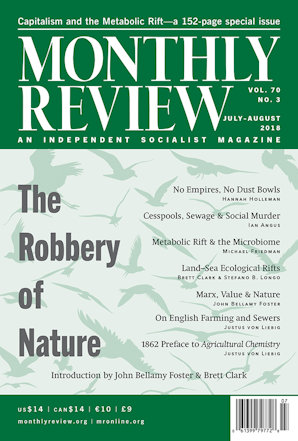Also in this issue
- The Robbery of Nature: Capitalism and the Metabolic Rift
- No Empires, No Dust Bowls: Ecological Disasters and the Lessons of History
- Cesspools, Sewage, and Social Murder: Environmental Crisis and Metabolic Rift in Nineteenth-Century London
- Metabolic Rift and the Human Microbiome
- Marx, Value, and Nature
- 1862 Preface to Agricultural Chemistry

